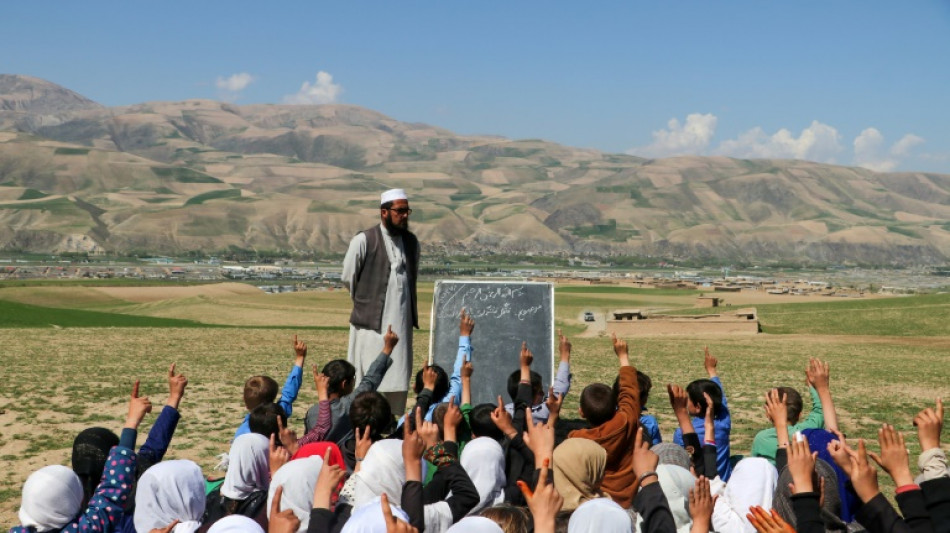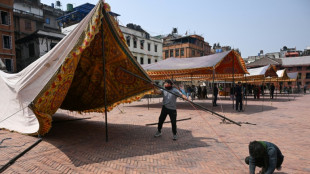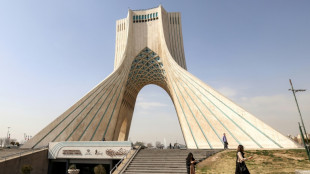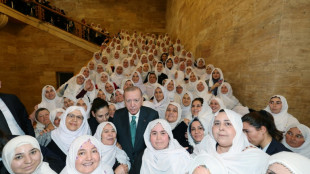
-
 Underdogs Wales could hurt Irish after Scotland display: Popham
Underdogs Wales could hurt Irish after Scotland display: Popham
-
Gilgeous-Alexander rules over Knicks again in Thunder win

-
 Hamilton reveals sequel in the works to blockbuster 'F1: The Movie'
Hamilton reveals sequel in the works to blockbuster 'F1: The Movie'
-
Alonso, Stroll fear 'permanent nerve damage' from vibrating Aston Martin

-
 China boosts military spending with eyes on US, Taiwan
China boosts military spending with eyes on US, Taiwan
-
Seoul leads rebound across Asian stocks, oil extends gains

-
 Tourism on hold as Middle East war casts uncertainty
Tourism on hold as Middle East war casts uncertainty
-
Bayern and Kane gambling with house money as Gladbach come to town

-
 Turkey invests in foreign legion to deliver LA Olympics gold
Turkey invests in foreign legion to deliver LA Olympics gold
-
Galthie's France blessed with unprecedented talent: Saint-Andre

-
 Voice coach to the stars says Aussie actors nail tricky accents
Voice coach to the stars says Aussie actors nail tricky accents
-
Rahm rejection of DP World Tour deal 'a shame' - McIlroy

-
 Israel keeps up Lebanon strikes as ground forces advance
Israel keeps up Lebanon strikes as ground forces advance
-
China prioritises energy and diplomacy over Iran support

-
 Canada PM Carney says can't rule out military participation in Iran war
Canada PM Carney says can't rule out military participation in Iran war
-
Verstappen says new Red Bull car gave him 'goosebumps'

-
 Swiss to vote on creating giant 'climate fund'
Swiss to vote on creating giant 'climate fund'
-
Google to open German centre for 'AI development'

-
 Winter Paralympics to start with icy blast as Ukraine lead ceremony boycott
Winter Paralympics to start with icy blast as Ukraine lead ceremony boycott
-
Sci-fi without AI: Oscar nominated 'Arco' director prefers human touch

-
 Ex-guerrillas battle low support in Colombia election
Ex-guerrillas battle low support in Colombia election
-
'She's coming back': Djokovic predicts Serena return

-
 Hamilton vows 'no holding back' in his 20th Formula One season
Hamilton vows 'no holding back' in his 20th Formula One season
-
Two-thirds of Cuba, including Havana, hit by blackout

-
 US sinks Iranian warship off Sri Lanka as war spreads
US sinks Iranian warship off Sri Lanka as war spreads
-
After oil, US moves to secure access to Venezuelan minerals

-
 Arteta hits back at Brighton criticism after Arsenal boost title bid
Arteta hits back at Brighton criticism after Arsenal boost title bid
-
Carrick says 'defeat hurts' after first loss as Man Utd boss

-
 Ecuador expels Cuba envoy, rest of mission
Ecuador expels Cuba envoy, rest of mission
-
Arsenal stretch lead at top of Premier League as Man City falter

-
 Title race not over vows Guardiola after Man City held by Forest
Title race not over vows Guardiola after Man City held by Forest
-
Rosenior hails 'world class' Joao Pedro after hat-trick crushes Villa

-
 Brazil ratifies EU-Mercosur trade deal
Brazil ratifies EU-Mercosur trade deal
-
Real Sociedad edge rivals Athletic to reach Copa del Rey final

-
 Chelsea boost top four push as Joao Pedro treble routs Villa
Chelsea boost top four push as Joao Pedro treble routs Villa
-
Leverkusen sink Hamburg to keep in touch with top four

-
 Love match: WTA No. 1 Sabalenka announces engagement
Love match: WTA No. 1 Sabalenka announces engagement
-
Man City falter as Premier League leaders Arsenal go seven points clear

-
 Man City title bid rocked by Forest draw
Man City title bid rocked by Forest draw
-
Defending champ Draper ready to ramp up return at Indian Wells

-
 Arsenal extend lead in title race after Saka sinks Brighton
Arsenal extend lead in title race after Saka sinks Brighton
-
US, European stocks rise as oil prices steady; Asian indexes tumble

-
 Trump rates Iran war as '15 out of 10'
Trump rates Iran war as '15 out of 10'
-
Nepal votes in key post-uprising polls

-
 US Fed warns 'economic uncertainty' weighing on consumers
US Fed warns 'economic uncertainty' weighing on consumers
-
Florida family sues Google after AI chatbot allegedly coached suicide

-
 Alcaraz unbeaten run under threat from Sinner, Djokovic at Indian Wells
Alcaraz unbeaten run under threat from Sinner, Djokovic at Indian Wells
-
Iran's supreme leader gone, but opposition still at war with itself

-
 Mideast war rekindles European fears over soaring gas prices
Mideast war rekindles European fears over soaring gas prices
-
'Miracle to walk' says golfer after lift shaft fall


Afghan girls and women cling to glitchy, lonesome online learning
Sequestered at home in a remote Afghan town, 18-year-old Shekiba often roams the house hunting for the patchy internet signal that is her last link to an education.
Shekiba has turned to online learning since the Taliban returned to power in 2021 and shut her out of classrooms, signing up for live economics lectures she squints at on a pocket-sized phone screen.
She hopes to save for a laptop but is forced to buy expensive mobile data packages that still don't guarantee a signal in the town of Ishkashim perched high in mountainous Badakhshan province.
"If there were no internet issues, it would be much easier," she told AFP by phone. "But it's better to carry on, instead of sitting and doing nothing."
"I just hope to study, to succeed, to progress. If one person progresses in a family, the whole family progresses, as well as the whole society."
Boys and men returned to classes with the start of the Afghan new year, but girls and women will be left behind again by a Taliban government education blockade that is part of a raft of restrictions the United Nations has labelled "gender apartheid".
While online alternatives have sprung up, a dearth of computers and internet, as well as the isolation of learning via screen, makes them a poor substitute for in-person learning, students and teachers say.
Many of those alternatives also cannot provide diplomas, which offer a promise that qualifications will be acknowledged.
- 'No perspective of future' -
It's unclear exactly how many girls and women are involved in online learning, but two higher education platforms report Afghans registering or applying in the tens of thousands since the Taliban takeover.
Begum Academy, an online platform with some 8,500 free videos in Dari and Pashto covering the Afghan secondary school curriculum, launched in December 2023 and quickly had more than 3,000 users.
Director Hamida Aman said parents are grateful but it's hard for girls to stay driven.
"It's difficult to get motivated when everything is closed to you and there's no perspective of future," she told AFP from France, where she is based.
"These girls cannot have certificates, or they cannot have the ambition to go to the university or to have any job later."
Education for girls and women was a key aim of the US-backed government but gains were largely limited to cities, with only 23 percent of girls aged 13 to 18 in school nationwide, according to the International Crisis Group.
The think tank said that figure dropped to 13 percent after the Taliban government issued its edicts barring female education in 2022.
Zainab was soon to start high school when it came into effect and was twice rebuffed by an online school that was at capacity before she finally secured a place.
"Before taking online classes, we were idle at home. We were worried. We used to sleep most of the time, which made us depressed," said Zainab, who asked not to use her full name for fear of reprisal.
Online classes "keep us busy", she told AFP, but they "cannot replace schools".
Twenty-two-year-old Ruhila teaches English classes online while trying to continue her university education, also virtually, and says the teaching helps her spirits.
"The only thing that gives me energy in the current situation is teaching these girls," she said.
"But when you accept that it's going to be online forever then you lose enthusiasm and you don't put in the same effort," she said. "Mentally, online classes are very tough. They are stressful, and boring."
Taliban authorities have insisted since girls were barred from secondary school that they are working on establishing a system that aligns with their interpretation of Islamic law.
- Poor internet, few computers -
Widespread virtual schooling during the Covid-19 pandemic demonstrated it was "at best, a rather partial substitute for in-person instruction", a UNESCO report found.
Afghan students face the burden of trying to log on in a country where the internet is often down -- or painfully slow -- and where electricity outages are common.
Less than a quarter of the population uses the internet, according to online insights company DataReportal. With stark poverty rates in Afghanistan, computers are also a luxury many cannot afford.
Some 90 percent of Begum Academy students use their phones to learn, according to Aman.
But even more than those frustrations, 18-year-old Aisha misses the social aspect of school.
"Online classes cannot be as effective as physical classes where we meet our peers and our teachers and exchange our ideas," she said.
"Online courses can only give us a hope," she added. "But we can never say, 'I have studied online so I have graduated from school.'"
M.Schneider--VB




